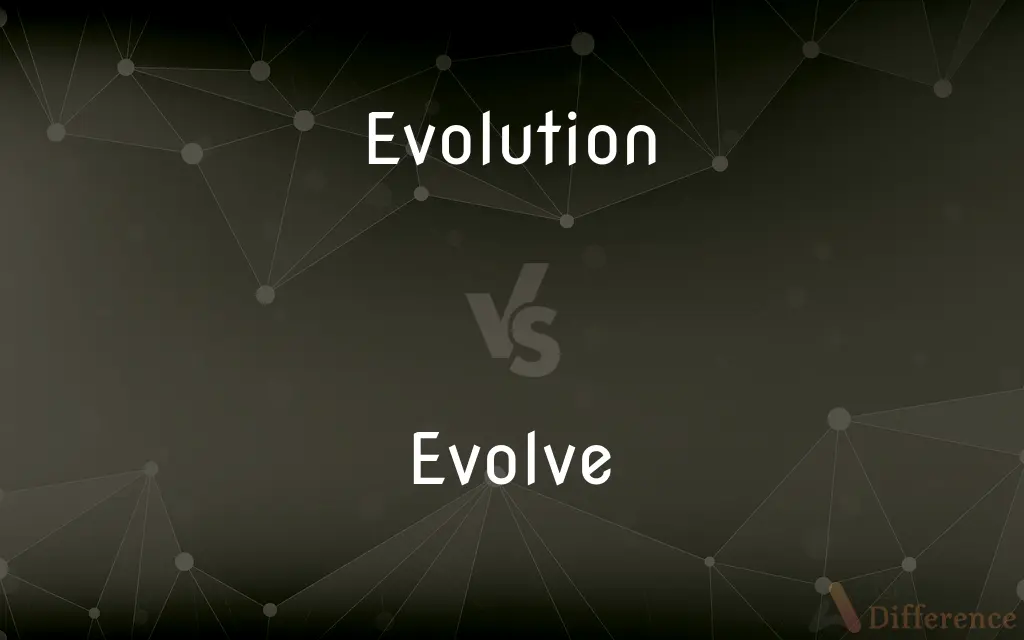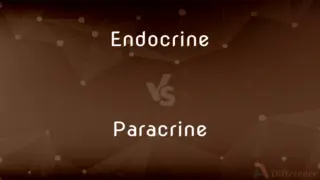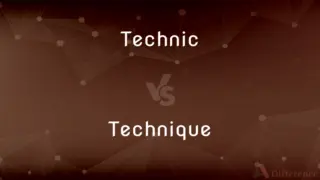Evolution vs. Evolve — What's the Difference?
By Tayyaba Rehman & Fiza Rafique — Updated on April 22, 2024
Evolution refers to the gradual development of species over time, often driven by natural selection; evolve describes the process of change in a particular direction.

Difference Between Evolution and Evolve
Table of Contents
ADVERTISEMENT
Key Differences
Evolution is the broad scientific theory explaining how biological species change over generations due to genetic variations and environmental factors, whereas evolve refers to the process by which an individual organism or species undergoes change or development.
Evolution encompasses changes across populations and over long timescales, while evolve typically describes changes within a species or specific entity over a shorter period.
In biology, evolution explains the diversity of life through mechanisms like mutation and natural selection, whereas to evolve often implies a specific, observable change in phenotype or behavior in response to environmental challenges.
Evolution is often discussed in the context of populations and their genetic makeup changing over generations, on the other hand, evolve is used to describe the process affecting individuals or specific groups within those populations.
Evolution is a key concept in understanding the history of life on Earth and the development of biodiversity, whereas evolve is crucial for understanding how current species adapt to their environments.
ADVERTISEMENT
Comparison Chart
Definition
The process by which different kinds of living organisms are thought to have developed and diversified from earlier forms during the history of the earth.
Undergo development or change gradually.
Usage in Language
Noun
Verb
Context
Biological, geological
Biological, technological, personal growth
Scope
Population level, over generations
Individual or specific group, often shorter timescale
Example in Sentence
The evolution of dinosaurs into birds is a well-documented phenomenon in paleontology.
Species may evolve to become resistant to antibiotics.
Compare with Definitions
Evolution
Biological evolution.
The theory of evolution by natural selection was first formulated by Charles Darwin.
Evolve
Develop gradually.
His ideas on democracy continued to evolve throughout his life.
Evolution
Cultural evolution.
The evolution of language can be traced through historical documents.
Evolve
Biological change.
Some lizards evolve longer legs to escape predators faster.
Evolution
Technological evolution.
The rapid evolution of mobile technology has transformed communication.
Evolve
Personal growth.
Over the years, her writing style has evolved dramatically.
Evolution
Gradual development.
The evolution of jazz music saw many styles merge over decades.
Evolve
Technological advancement.
As technologies evolve, new industries emerge.
Evolution
Evolutionary theory.
Evolutionary biology studies the evolutionary processes that produced the diversity of life on Earth.
Evolve
Adaptation to environment.
Desert plants have evolved to conserve water efficiently.
Evolution
Evolution is change in the heritable characteristics of biological populations over successive generations. These characteristics are the expressions of genes that are passed on from parent to offspring during reproduction.
Evolve
To develop or achieve gradually
Evolve a style of one's own.
Evolution
The process by which different kinds of living organism are believed to have developed from earlier forms during the history of the earth.
Evolve
To work (something) out; devise
"the schemes he evolved to line his purse" (S.J. Perelman).
Evolution
The gradual development of something
The forms of written languages undergo constant evolution
Evolve
(Biology) To develop (a characteristic) by evolutionary processes.
Evolution
The giving off of a gaseous product, or of heat
The evolution of oxygen occurs rapidly in this process
Evolve
To give off; emit.
Evolution
A pattern of movements or manoeuvres
Flocks of waders often perform aerial evolutions
Evolve
To undergo gradual change; develop
An amateur acting group that evolved into a theatrical company.
Evolution
The extraction of a root from a given quantity.
Evolve
(Biology) To arise or transform through evolutionary processes.
Evolution
A gradual process in which something changes into a different and usually more complex or better form.
Evolve
To move in regular procession through a system.
Evolution
A result of this process; a development
Judo is an evolution of an earlier martial art.
Evolve
(intransitive) To change; transform.
What began as a few lines of code has now evolved into a million-line behemoth.
Evolution
Change in the genetic composition of a population during successive generations, often resulting in the development of new species. The mechanisms of evolution include natural selection acting on the genetic variation among individuals, mutation, migration, and genetic drift.
Evolve
To come into being; develop.
Evolution
The historical development of a related group of organisms; phylogeny.
Evolve
(biology) Of a population, to change genetic composition over successive generations through the process of evolution.
A hundred thousand years from now, will Homo sapiens have evolved into beings unrecognisable to their ancestors?
Evolution
(Astronomy) Change in the structure, chemical composition, or dynamical properties of a celestial object or system such as a planetary system, star, or galaxy. Evolution often changes the observable or measurable characteristics of the object or system.
Evolve
(intransitive) Of a trait, to develop within a population via biological evolution.
How long ago did beaks evolve?
Evolution
A movement that is part of a set of ordered movements
Naval evolutions in preparation for battle.
Evolve
(transitive) Of a population, to acquire or develop (a trait) in the process of biological evolution.
How long ago did birds evolve beaks?
Evolution
(Mathematics) The extraction of a root of a quantity.
Evolve
(chemistry) To give off (gas, such as oxygen or carbon dioxide during a reaction).
To evolve odours
Evolution
A change of position.
Evolve
(transitive) To cause something to change or transform.
Evolution
(military) A manoeuvre of troops or ships.
Evolve
To unfold or unroll; to open and expand; to disentangle and exhibit clearly and satisfactorily; to develop; to derive; to educe.
The animal soul sooner evolves itself to its full orb and extent than the human soul.
The principles which art involves, science alone evolves.
Not by any power evolved from man's own resources, but by a power which descended from above.
Evolution
A turning movement, especially of the body.
Evolve
To throw out; to emit; as, to evolve odors.
Evolution
(obsolete) A turned or twisted shape; an involution, a complex or intricate shape.
Evolve
To become open, disclosed, or developed; to pass through a process of evolution.
Evolution
An unfolding.
Evolve
Work out;
We have developed a new theory of evolution
Evolution
The act or process of unfolding or opening out; the progression of events in regular succession.
Evolve
Undergo development or evolution;
Modern man evolved a long time ago
Evolution
(geometry) The opening out of a curve; now more generally, the gradual transformation of a curve by a change of the conditions generating it.
Evolve
Gain through experience;
I acquired a strong aversion to television
Children must develop a sense of right and wrong
Dave developed leadership qualities in his new position
Develop a passion for painting
Evolution
The extraction of a root from a given power.
Evolution
(chemistry) The act or an instance of giving off gas; emission.
Evolution
Process of development.
Evolution
Development; the act or result of developing what was implicit in an idea, argument etc.
The ongoing evolution of Lolita subculture fashion includes, among other things, the ballet style.
Evolution
A process of gradual change in a given system, subject, product etc., especially from simpler to more complex forms.
Among other forms of change, the evolution of transportation has involved modification, diversification, convergence, divergence, hybridization, differentiation, and naturally, selection.
Evolution
(biology) The transformation of animals, plants and other living things into different forms (now understood as a change in genetic composition) by the accumulation of changes over successive generations.
Evolution
The act of unfolding or unrolling; hence, any process of growth or development; as, the evolution of a flower from a bud, or an animal from the egg.
Evolution
A series of things unrolled or unfolded.
Evolution
The formation of an involute by unwrapping a thread from a curve as an evolute.
Evolution
The extraction of roots; - the reverse of involution.
Evolution
A prescribed movement of a body of troops, or a vessel or fleet; any movement designed to effect a new arrangement or disposition; a maneuver.
Those evolutions are best which can be executed with the greatest celerity, compatible with regularity.
Evolution
A general name for the history of the steps by which any living organism has acquired the morphological and physiological characters which distinguish it; a gradual unfolding of successive phases of growth or development.
Evolution
That theory of generation which supposes the germ to preëxist in the parent, and its parts to be developed, but not actually formed, by the procreative act; - opposed to epigenesis.
Evolution
That series of changes under natural law which involves continuous progress from the homogeneous to the heterogeneous in structure, and from the single and simple to the diverse and manifold in quality or function. The process is by some limited to organic beings; by others it is applied to the inorganic and the psychical. It is also applied to explain the existence and growth of institutions, manners, language, civilization, and every product of human activity. The agencies and laws of the process are variously explained by different philosophrs.
Evolution is to me series with development.
Evolution
A process in which something passes by degrees to a different stage (especially a more advanced or mature stage);
The development of his ideas took many years
The evolution of Greek civilization
The slow development of her skill as a writer
Evolution
(biology) the sequence of events involved in the evolutionary development of a species or taxonomic group of organisms
Common Curiosities
What is evolution?
Evolution is the process by which organisms change over generations due to genetic variations and environmental factors.
Is evolve always biological?
No, evolve can also refer to non-biological processes like the evolution of ideas or technology.
What does it mean for a species to evolve?
To evolve means that a species undergoes genetic change over time, which can affect its physical form, behavior, or capabilities.
How does evolution differ from evolve in a scientific context?
Evolution refers to changes at the population level over long periods, whereas evolve refers to changes within a species or individual over a shorter period.
Can evolution occur without individual organisms evolving?
Yes, evolution is a broader process affecting populations and species, not necessarily involving observable changes in individual organisms.
What role does genetic variation play in evolution?
Genetic variation is the raw material for evolution, allowing populations to adapt to changing environments.
What triggers a species to evolve?
Environmental pressures, mutations, and genetic drift are key factors that cause species to evolve.
Can cultural aspects evolve?
Yes, cultural evolution occurs as societies change their behaviors, technologies, and social norms over time.
How do humans contribute to the evolution of other species?
Human activities like agriculture, urbanization, and pollution can drive evolutionary changes in other species.
How is evolution evidenced?
Fossil records, genetic data, and observable changes in current organisms provide evidence for evolution.
Does evolve always imply improvement?
No, while evolve often involves adaptation, it does not necessarily mean an improvement, but rather a change suited to current conditions.
What are some examples of rapid evolution?
The development of antibiotic resistance in bacteria is a prime example of rapid evolution.
Share Your Discovery

Previous Comparison
Endocrine vs. Paracrine
Next Comparison
Technic vs. TechniqueAuthor Spotlight
Written by
Tayyaba RehmanTayyaba Rehman is a distinguished writer, currently serving as a primary contributor to askdifference.com. As a researcher in semantics and etymology, Tayyaba's passion for the complexity of languages and their distinctions has found a perfect home on the platform. Tayyaba delves into the intricacies of language, distinguishing between commonly confused words and phrases, thereby providing clarity for readers worldwide.
Co-written by
Fiza RafiqueFiza Rafique is a skilled content writer at AskDifference.com, where she meticulously refines and enhances written pieces. Drawing from her vast editorial expertise, Fiza ensures clarity, accuracy, and precision in every article. Passionate about language, she continually seeks to elevate the quality of content for readers worldwide.














































